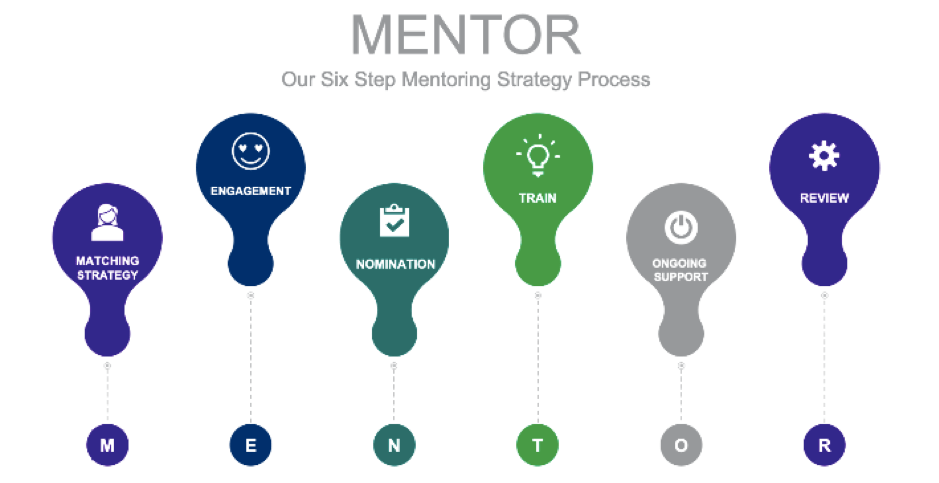My last blog post was A Year in the Life of an Organisation’s Mentoring Programme. In that post, I introduced you to the Mentoring Programme that we are developing and implementing for a client. We are working with a worldwide organisation to implement a programme of mentoring to develop the careers of junior female scientific researchers. In this series of blog posts, I am sharing with you how we went about delivering the project.
The first blog post in the series, I outlined the first step we took in line with our MENTOR model. In this blog post, I’ll share our implementation of the second step in our MENTOR model which is the Engagement step. This step is all about creating excitement so that people want to take part in the programme as mentors and/or mentees. Driving up mentoring programme engagement, throughout the organisation.
The MENTOR Model Our Six Step Mentoring Strategy Process

The clarion call to action
Clarion call is defined as a strongly expressed demand or request for action. That’s what you want to communicate at the launch of any mentoring programme. The key to any effective ‘call to action’ is to find the hook that will grab the attention of your audience.
In 2020, with its restrictions on face to face meetings and workplace camaraderie, regular contact with each and every employee has become of increasing importance. There will always be people that ask for help, demand attention and make their own fun at work – and in equal measure, there are those that are least open, vocal and demanding. Yet, everyone deserves to be heard, listened to, and communicated with.
We know that the mental health of many people during lock-down has suffered. The Centre for Mental Health has been reviewing the evidence of the impact of the Covid 19 pandemic on mental health. They point to the conclusion that up to 10 million people in England will need mental health support. They tell us that mental health is made in communities. Employers have an obligation to make more efforts to engage and communicate with employees. They need to develop new ways to motivate, support and develop their people. Many organisations are turning to mentoring communities to fill the gaps in their communication and engagement strategies.
Joanna Swash, CEO Moneypenny
“If you are a leader or manager, really your everyday life is about mentoring – in the sense of creating an environment where people can thrive, where they feel safe and secure and able to develop.”
Some would say this is evidence of a move towards the latest big buzz in the human resources world. That is the theme of treating people like people and not paperclips. (People Not Paperclips: Putting the human back into Human Resources is a book by Kath Howard)
Mentoring Online
2020 was the perfect year to launch an online mentoring programme. We have all had to become so much more creative in how we overcame the barriers raised through the global pandemic. Working from home and learning how to communicate in a range of online environments has enabled organisations to deliver projects that would have never got off the ground at another time. Trying to arrange a worldwide mentorship programme would have been costly both in time and travel budgets. But even more critically, cultural restrictions may have limited its scope and accessibility.
Experience has shown that the mentoring relationship can be developed very well online. It may in fact speed up the trust between participants. According to an article by the Institute of Leadership and Management, it may help to support and build cultural diversity, (preserving interracial friendships in remote teams).
But more of this later when I will share the experience of the mentors and mentees I am working with.
There may be various reasons for developing your own organisational mentorship programme. It may be for staff engagement, career development, to welcome new employees or other reasons. Whatever the reason, it is important to generate excitement in order to drive mentoring programme engagement across the organisation. It is important to build a community of mentors with skills, knowledge and experience.
Step 2: Mentoring Programme Engagement. Putting it into practice
We listened closely to the regional organisers based in the research centres across the world. We then selected the hooks to be able to excite interest in both mentors and mentees. These included:
- Celebrating the progress of women in this area of research
- Removing barriers to career progression for women in all cultures around the world
- Highlighting the benefits to be found in the mentoring of others
- Demonstrating how we can use our mentoring skills in all walks of life
- The impact of mentoring on people and their careers
Together, we built a communication plan to meet the needs of all the communities we wanted to reach. The main engagement tool we used as a focal point for our ‘call to action’ was a webinar. We selected this for many reasons. It gave us an opportunity to communicate as close to personal and face to face as we are able without travelling to all four corners of the world. It gave us a way to communicate and share the benefits of mentoring simply and effectively and to an audience whose first language was not English. The participants had opportunities to ask all their questions and for us to share the project proposals and timelines. Finally, it gave participants a realistic example of how further online training and the mentoring experience itself would feel.
Online training the right way
Webinars have bad press as many register their interest only as a way of receiving the slides or expect to listen in whilst working on other things. At Antoinette Oglethorpe Ltd, we are passionate about making sure that we avoid these traps. We make our webinars participative, engaging and focussed on our audience needs.
At the end of the webinar, we asked all those attending if they were interested in becoming a mentor or a mentee. And we gave them an immediate link to apply – catching them while they are hot! Giving people an easy, friendly and online experience helps to reduce barriers and gets people to act while they are interested.
Now we are oversubscribed and have created a groundswell of excitement and interest with mentoring programme engagement at an all time high.
Next time I will share our experience putting Step 3: Nomination into practice. People are currently nominating themselves for the programme. Our job is now to review the applications. Then we can nominate pairings that match mentors with mentees to maximise their mentoring outcomes.
If you’re looking to create a mentoring programme in your organisation, you may like to download a free copy of our eBook M-Power. A practical guide to mentoring in the workplace. It will provide you with the information you need to promote mentoring in your organisation. You will gain an appreciation of the areas you need to consider if you are going to introduce mentoring. And you’ll discover the steps you need to take to make mentoring work in practice.




1 thought on “How to Engage Participants in Your Mentoring Programme”
A fabulous insight into setting up and engaging folk in a mentoring programme – the involvement of the client and really understanding their perspectives was certainly key by the sound of it! Thank you Oona for such an insight.